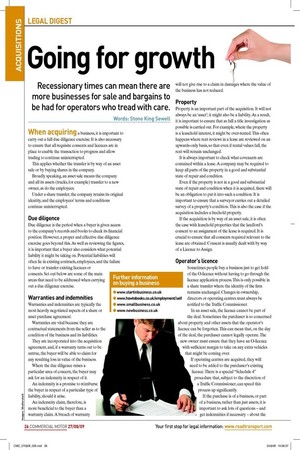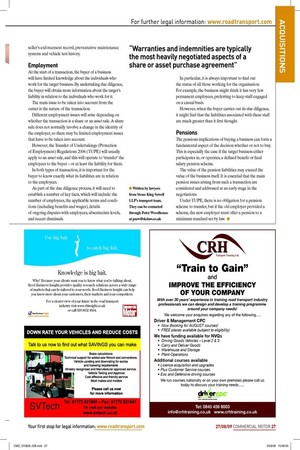Going for growth
Page 26

Page 27

If you've noticed an error in this article please click here to report it so we can fix it.
Recessionary times can mean there are more businesses for sale and bargains to be had for operators who tread with care.
Words: Stone King Sewell
When acquiring a business, it is important to carry out a full due diligence exercise. It is also necessary to ensure that all requisite consents and licences are in place to enable the transaction to progress and allow trading to continue uninterrupted.
This applies whether the transfer is by way of an asset sale or by buying shares in the company.
Broadly speaking, an asset sale means the company and all its assets (trucks, for example) transfer to a new owner, as do the employees.
Under a share transfer, the company retains its original identity, and the employees’ terms and conditions continue uninterrupted.
Due diligence
Due diligence is the period when a buyer is given access to the company’s records and books to check its inancial position. However, a proper and effective due diligence exercise goes beyond this. As well as reviewing the igures, it is important that a buyer also considers what potential liability it might be taking on. Potential liabilities will often lie in existing contracts, employees, and the failure to have or transfer existing licences or consents. Set out below are some of the main areas that need to be addressed when carrying out a due diligence exercise.
Warranties and indemnities
Warranties and indemnities are typically the most heavily negotiated aspects of a share or asset purchase agreement.
Warranties are vital because they are contractual statements from the seller as to the condition of the business and its liabilities.
They are incorporated into the acquisition agreement, and, if a warranty turns out to be untrue, the buyer will be able to claim for any resulting loss in value of the business.
Where the due diligence raises a particular area of concern, the buyer may ask for an indemnity in respect of it.
An indemnity is a promise to reimburse the buyer in respect of a particular type of liability, should it arise.
An indemnity claim, therefore, is more beneicial to the buyer than a warranty claim. A breach of warranty will not give rise to a claim in damages where the value of the business has not reduced.
Property
Property is an important part of the acquisition. It will not always be an ‘asset’; it might also be a liability. As a result, it is important to ensure that as full a title investigation as possible is carried out. For example, where the property is a leasehold interest, it might be over-rented. This often happens where rent reviews in a lease are reviewed on an upwards-only basis, so that even if rental values fall, the rent will remain unchanged.
It is always important to check what covenants are contained within a lease. A company may be required to keep all parts of the property in a good and substantial state of repair and condition.
Even if the property is not in a good and substantial state of repair and condition when it is acquired, there will be an obligation to put it into such a condition. It is important to ensure that a surveyor carries out a detailed survey of a property’s condition. This is also the case if the acquisition includes a freehold property.
If the acquisition is by way of an asset sale, it is often the case with leasehold properties that the landlord’s consent to an assignment of the lease is required. It is crucial to ensure that all consents required relevant to the lease are obtained. Consent is usually dealt with by way of a Licence to Assign.
Operator’s licence
Sometimes people buy a business just to get hold of the O-licence without having to go through the licence application process. This is only possible in a share transfer where the identity of the irm remains unchanged. Changes in ownership, directors or operating centres must always be notiied to the Trafic Commissioner.
In an asset sale, the licence cannot be part of the deal. Sometimes the purchaser is so concerned about property and other assets that the operator’s licence can be forgotten. This can mean that, on the day of the deal, the purchaser cannot legally operate. The new owner must ensure that they have an O-licence with suficient margin to take on any extra vehicles that might be coming over.
If operating centres are acquired, they will need to be added to the purchaser’s existing licence. There is a special “Schedule 4” procedure that, subject to the discretion of a Trafic Commissioner, can speed this process up signiicantly.
If the purchase is of a business, or part of a business, rather than just assets, it is important to ask lots of questions – and get indemnities if necessary – about the seller’s enforcement record, preventative maintenance systems and vehicle test history.
Employment
At the start of a transaction, the buyer of a business will have limited knowledge about the individuals who work for the target business. By undertaking due diligence, the buyer will obtain more information about the target’s liability in relation to the individuals who work for it.
The main issue to be taken into account from the outset is the nature of the transaction.
Different employment issues will arise depending on
���
whether the transaction is a share or an asset sale. A share sale does not normally involve a change in the identity of the employer, so there may be limited employment issues that have to be taken into account.
However, the Transfer of Undertakings (Protection of Employment) Regulations 2006 (TUPE) will usually Advert apply to an asset sale, and this will operate to ‘transfer’ the employees to the buyer – or at least the liability for them.
In both types of transaction, it is important for the buyer to know exactly what its liabilities are in relation to the employees.
As part of the due diligence process, it will need to establish a number of key facts, which will include: the number of employees, the applicable terms and conditions (including beneits and wages), details of ongoing disputes with employees, absenteeism levels, and recent dismissals.


























































